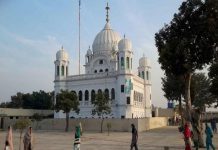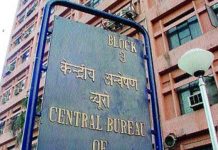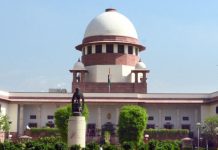 Amidst all criticisms for majority based politics, Hindu-centric propagandas and one man worship, the ruling Bhartiya Janata Party (BJP) led National Democratic Alliance (NDA) emerged victorious in India’s general election with an inherent undercurrent of cautious nationalism. The populous country witnessed many weeks long electoral exercise where over 700 million voters participated in the process to send their representatives to the lower house of Parliament.
Amidst all criticisms for majority based politics, Hindu-centric propagandas and one man worship, the ruling Bhartiya Janata Party (BJP) led National Democratic Alliance (NDA) emerged victorious in India’s general election with an inherent undercurrent of cautious nationalism. The populous country witnessed many weeks long electoral exercise where over 700 million voters participated in the process to send their representatives to the lower house of Parliament.
BJP alone captured over 300 Parliamentary seats in 543 member Lok Sabha (LS) where the magic number to form the federal government in New Delhi is 272 and NDA crosses the mark of 350 LS seats, which is far better than the last general elections in 2014. The nationalist political party, led by hardliner Prime Minister Narendra Modi also succeeded in spreading its presence to almost all corners of the vast south-Asian country. Even in the restive northeast India, where separatist elements once run almost parallel administrations in various parts, the Lotus bloomed for the saffron party. The region with 25 Parliamentary seats was swept by the BJP and its allies to elect 18 members to the NDA tally in 17th Lok Sabha. More importantly, the Arunachal Pradesh voters have elected a BJP government in Itanagar and Sikkim electorate chosen NDA constitute Sikkim Krantikari Morcha (SKM) for the new government in Gangtok.
Amidst all negative speculations, aroused of anti-citizenship amendment bill (CAB) rows in Brahmaputra valley along with various other parts of the region, the BJP succeeded in increased its tally from seven to nine LS seats in Assam, where the opposition Congress could retain its three seats and All India United Democratic Front (AIUDF) got reduced to the lone LS seat party.
No insurgent outfits threatened the people to boycott elections this time in the region, where the dedicated voters exercised their franchises with an impressive over 80% turn out. Making it a habit to defy the diktats of separatist militants all the years, the electorate sealed the fate of candidates in EVM (supported by VVPAT) and reposed faiths on the largest multi-party democracy on Earth. Not less than hundred civil society groups and opposition political parties including the Congress put the region in turmoil over the CAB, which was designed by the ruling party to help asylum seekers from Muslim majority Afghanistan, Pakistan and Bangladesh getting Indian citizenship. Numerous protest programs were organized almost across the region targeting the BJP leadership, however the angers did not translate into votes against the saffron party. On the contrast, the BJP recorded the best ever performance in the region, but the grand old party faced defeat. Keeping alive the national trend, where many veteran Congress leaders lost the electoral battles, voters of the region have rejected many influential Congress candidates. While the Congress was losing its vote-shares, the BJP has successfully won two LS seats of Tripura and one seat of Manipur for the first time.
In Barak valley of Assam, where most of the people supported the CAB, both the LS seats were won by BJP nominees. All India Women Congress president and sitting MP Sushmita Dev faced defeat in Silchar LS seat, where BJP candidate Dr Rajdeep Roy emerged the winner. The other LS seat of Karimganj was won by saffron candidate and Assam Assembly deputy speaker Kripanath Mallah defeating his nearest rival and sitting AIUDF Parliamentarian Radheshyam Biswas in an impressive poll-battle.
Promising saffron leader Dilip Saikia defeated veteran Congress leader and sitting Rajya Sabha member Bhubaneswar Kalita in Mangaldoi Parliamentary constituency. Similarly, another senior Congress leader and a former Union minister Paban Singh Ghatowar was defeated by sitting BJP MP Rameswar Teli in Dibrugarh LS seat. Same fate was reported for aged Congress leader Biren Sing Engti, who lost the electoral fights to his nearest rival Haren Sing Bey of BJP in the autonomous district (Diphu) LS seat. Congress nominee and former State additional chief secretary MGVK Bhanu was trounced by BJP leader and State minister Pallab Lochan Das in Tezpur LS seat. Gifted Congress candidate Sushanta Borgohain also lost to BJP nominee and State minister Tapan Kr Gogoi in Jorhat LS seat.
BJP nominee Queen Oja easily defeated Congress candidate Bobbeeta Sharma in the prestigious Guwahati LS constituency. Similarly sitting BJP MP Pradan Baruah emerged victorious against Congress candidate Anil Borgohain in Lakhimpur LS seat. The Congress retained the Kaliabor LS seat where sitting MP Gaurav Gogoi defeated his closest rival Mani Madhav Mahanta, who was nominated by BJP ally Asom Gana Parishad (AGP). Another AGP nominee Kumar Deepak Das faced defeat in Barpeta LS seat by Congress legislator Abdul Khaleque.
Only seat inside Assam, which the BJP failed to retain was Nagaon Parliamentary constituency, where local legislator Rupak Sarmah faced defeat to his Congress rival Pradyut Bordoloi, who was a minister in Tarun Gogoi’s cabinet. Business tycoon Badruddin Ajmal led AIUDF could retain only one seat as Ajmal himself won from Dhubri Parliamentary constituency defeating his nearest Congress rival Abu Taher Bepari. But the party, known as sympathetic to migrant Muslim settlers in Assam, failed in Barpeta and Karimganj LS seats. Lone successful independent candidate Naba (alias Hira) Sarania retained his Kokrajhar LS seat defeating State minister Pramila Rani Brahma, who was nominated by BJP ally Bodoland People’s Front (BPF). A former rebel belonged to the United Liberation Front of Assam, Sarania succeeded in overcoming challenges from two other important rivals of the Congress and UPPL. Tripura has elected two BJP representatives to Lok Sabha for the first time, keeping pace with the saffron wave that swept the State during the last Legislative Assembly polls. Saffron nominee Pratima Bhowmik defeated her closest rival Subal Bhowmik of the Congress in West Tripura LS seat. The other Parliamentary constituency (East Tripura) was won by BJP candidate Rabati Tripura defeating his nearest rival Pragya Debbarma of the Congress.
Two LS seats of Arunachal Pradesh were also won by BJP nominees. Union minister Kiren Rijiju defeated his nearest Congress rival and former State chief minister Nabam Tuki in Arunachal West LS seat. Similarly in Arunachal East Parliamentary seat BJP leader Tapir Gao emerged victorious against Congress nominee Lowangcha Wanglat. In the simultaneous Assembly elections too, the BJP turned victorious winning over 40 seats (out of 60). State chief minister Pema Khandu has proved his mettle to retain his position with a convincing victory as the saffron party can form the government with BJP legislators alone. Meanwhile, a slain legislator (Tirong Aboh of National People’s Party, who was killed by militants on 21 May in Tirap) was declared winner in the assembly polls.
The rightist party also won a Parliamentary constituency for the first time in Manipur, where the other LS seat was won by Naga People’s Front (NPF). BJP nominee RK Ranjan Singh defeated his closest rival O Nabakishore of the Congress in Inner Manipur LS seat, where NPF candidate Lorho S Pfoze emerged victorious against his rival BJP nominee H Shokhopao Mate in Outer Manipur LS seat.
In Meghalaya, NDA constitute National People’s Party (NPP) retained its Tura LS seat through former Union minister Agatha Sangma’s candidature. Daughter of former Lok Sabha Speaker Purno A Sangma and sister of Meghalaya chief minister Conrad Sangma defeated her nearest rival Mukul Sangma, the former Congress chief minister.
However the Shillong LS seat was retained by the Congress, where the sitting Parliamentarian Vincent Pala defeated his closest rival United Democratic Party (UDP) nominee Jemino Mawthoh. Another NDA partner Nationalist Democratic Progressive Party (NDPP) of Nagaland also succeeded in winning the lone LS seat defeating veteran Congress leader KL Chishi. NDPP’s Tokheho Yepthomi was declared winner in the Parliamentary seat, where present Nagaland chief minister Neiphiu Rio emerged victorious in 2014 national polls.
The lone LS seat of Mizoram was won by Mizo National Front (MNF) candidate C Lalrosanga. The former Indian broadcasting service officer defeated his nearest rival Lalnghinglova Hmar, an independent candidate supported by the Congress. NDA partner MNF nominee was also challenged by few other candidates in the poll battles.
NDA constitute SKM won the lone LS seat of Sikkim and also emerged victorious in the Assembly polls. SKM nominee Indra Hang Subba defeated his arch rival DB Katwal of Sikkim Democratic Front (SDF) in Parliamentary polls. On the other hand, Prem Singh Tamang led SKM won 17 seats in the 32 member legislative assembly ending over two decades long tenure of Pawan Kr Chamling as chief minister of the tiny State. Unlike many parts of the country, the alienated region witnessed peaceful, participatory and almost smooth polling that might have helped the residents of various ethnic communities to nurture a new kind of nationalism where the electorate set aside their differences and came forward for a strong, safe and prosperous India.
The author is a northeast India based journalist and political commentator
letters@tehelka.com













